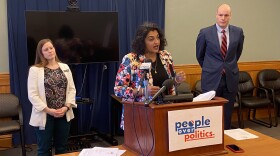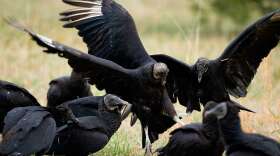-
Statehouse Democrats have some questions about the future of a Lee County fertilizer plant and its employees after it was acquired by a Koch Industries subsidiary.
-
A changing climate looks poised to increase wildfire conditions significantly. That would compound other growing risks, such as the aggressive spread of eastern red cedars.
-
The annual report by Iowa State University also shows varying values for farmland across the state.
-
U.S. Department of Agriculture officials say a continuing resolution dodged the worst case scenario for food assistance programs if the government shuts down after Nov. 17. Still, food advocates warn that Congress needs to act quickly and do more to make sure programs are fully funded.
-
Thousands of competitors come to the American Royal Livestock Show in Kansas City, Missouri, each year to show their best livestock. The competition includes children as young as 7 years old, who take part in a long tradition of raising and showing their animals.
-
Care farms are agricultural places for people with physical or mental health challenges to process their emotions, while performing farming tasks and working with animals. It’s a popular concept in Europe that hasn’t gained as much traction in the United States yet. But a new national network hopes to change that.
-
About a quarter of the United States’s irrigated cropland sits on top of the Ogallala Aquifer in the Great Plains. But water levels are dropping, and states are taking different approaches to monitoring how much groundwater irrigators are pumping out.
-
The farm bill sets crucial policy for food assistance, crop insurance and more, and it’s set to expire Sept. 30. Congress is unlikely to meet that deadline, and they still need to decide how much money to spend on the bill.
-
Ranchers across the Midwest are battling black vultures, a federally protected bird that has a reputation for killing newborn livestock. While the birds play a major ecological role, their expanding population is becoming a big nuisance for producers.
-
Midwest farmers aren't allowed to fix their own tractors. And many right-to-repair bills are stalledFarmers and ranchers across the Midwest say regulation is the only path forward to fixing their own equipment. But there’s been strong opposition to right to repair legislation, as manufacturers argue they’ve provided pathways for quick repairs.
Play Live Radio
Next Up:
0:00
0:00
Available On Air Stations










